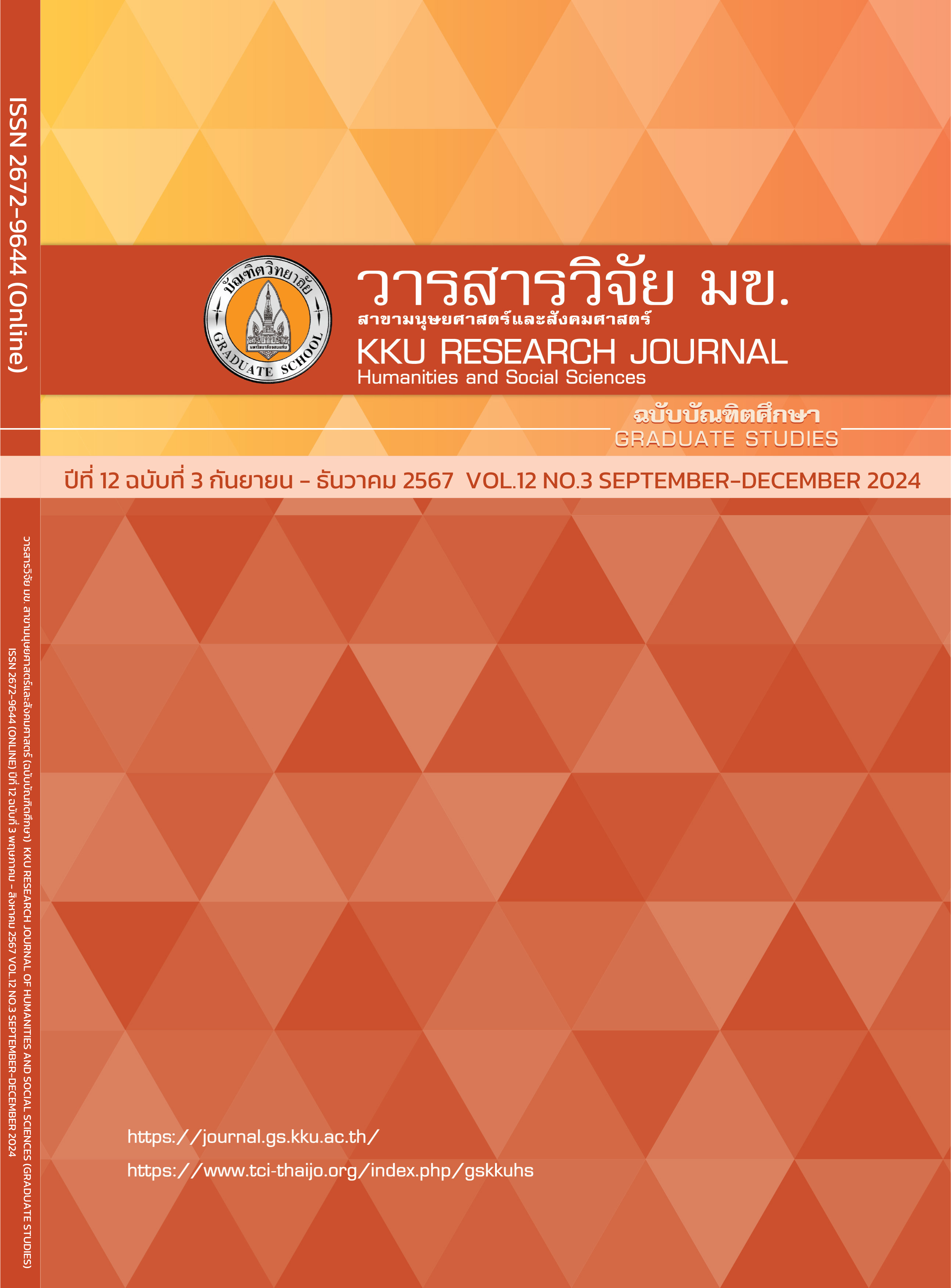Management of Food Waste from the Production Process into New Products under the Concept of Circular Economy
Keywords:
Food waste, New products, Circular economyAbstract
This academic article aimed 1) to study the production of new eco-friendly products from food waste from the production process into under the concept of circular economy and 2) to study the obstacles and challenges faced by producers in the production of new eco-friendly products from food waste from the production process. The food production process caused a large amount of food waste each year. Processing food waste from the production was the appropriate solution to food waste based on the principles and concepts of the circular economy as it brought economic, social and environmental benefits. Moreover, many consumers were likely to support these processed products as they were eco-friendly. The cycle of production of new eco-friendly products from food waste in production process contained various steps including procurement of raw materials as the food waste from the production process, product design, production process, distribution and sales of products, consumption, disposal of food waste from consumption. and reuse or recycle of food waste through processing. Producers however had to deal with the challenges from cost and knowledge barriers. Therefore, the stakeholders should recognize to these limitations and develop measures to enhance knowledge sharing to further develop the new products from food waste from the production process.
References
Ellen MacArthur Foundation. The butterfly diagram: visualising the circular economy. [Internet]. n.d. [cited 11 April 2024]. Available from: https://www.ellenmacarthurfoundation.org/circular-economy-diagram
EPA. United States 2030 Food Loss and Waste Reduction Goal. [Internet]. 2024. [cited 15 April 2024]. Available from: https://www.epa.gov/sustainable-management-food/united-states-2030-food-loss-and-waste-reduction-goal
European Commission. Avoiding food waste in manufacturing operations. [Internet]. n.d. [cited 11 April 2024]. Available from: https://greenbestpractice.jrc.ec.europa.eu/node/283
Forward Fooding. Food Waste: Understanding the issue before taking action. [Internet]. 2022. [cited 11 April 2024]. Available from: https://forwardfooding.com/blog/foodtech-trends-and-insights/food-waste-understanding-the-issue-before-taking-action/
Kachanun R. Circular Economy. [Internet]. 2015. [cited 5 March 2024]. Available from: https://www. parliament.go.th/ewtadmin/ewt/parliament_parcy/ewt_dl_link.php?nid=55024&filename=house2558
Kalmykova Y, Sadagopan M, Rosado L. Circular economy – From review of theories and practices to development of implementation tools. Resources, Conservation and Recycling. 2018; 135: 190-201.
Kestenbaum R. Customer Satisfaction Is More Important Than You Thought. [Internet]. 2018. [cited 5 March 2024]. Available from: https://www.forbes.com/sites/Richardkestenbaum/2018/12/ 04/customer-satisfaction-is-more-important-than-you-thought/?sh=62b7928d5ed9
Korhopnen J, Honkasalo A, Seppälä J. Circular Economy: The concept and its limitations. Ecological Economics. 2018; 143: 37-46.
Kulmethi P, Setthachoduk P, Sriprapai H, Chandrawattana A. Utilization of okara for wheat flour substitution in bread. The Journal of King Mongkut's University of Technology North Bangkok. 2010; 20(1): 97-105.
Lucyna L. The Capital Barrier to Innovation in the Small and Medium-Sized Enterprises. Comparative Economic Research Central and Eastern Europe. 2009; 12(1-2): 99-113.
Muñoz JV, Mendoza JMF, Aznar-Sánchez JA, Schmid AG. Circular economy implementation in the agricultural sector: Definition, strategies and indicators. Resources Conservation and Recycling. 2021; 170: 1-15.
ONEP. July 10, 2023, worrying! The amount of Thai food waste is increasing from overselling - buying extra. Faculty of Science, Thammasat University, recommends 4 ways to cope. [Internet]. 2023. [cited 5 March 2024]. Available from: www.onep.go.th/10-กรกฏาคม-2566-น่าห่วง-ปริมาณข/
Peluso AM, Pichierri M, Pino G. Age-related effects on environmentally sustainable purchases at the time of COVID-19: Evidence from Italy. Journal of Retailing and Consumer Services. 2021: 60.
Rahimi, E., Rostami, N. A., Shad, F. S., & Vafaei, V. The importance of knowledge management on innovation. Applied mathematics in engineering, management and technology. 2017; 5(1): 68-73.
Ravasi D, Stigliani I. Product Design: A Review and Research Agenda for Management Studies. International Journal of Management Reviews. 2012; 14(4): 1-43.
RTS. Food Waste in America in 2024. [Internet]. 2024. [cited 5 March 2024]. Available from: https://www.rts.com/resources/guides/food-waste-america/
SDG Move. Basic information about SDGs. [Internet]. n.d. [cited 11 April 2024]. Available from: https://www.sdgmove.com/intro-to-sdgs/
Seberini A. Economic, social and environmental world impacts of food waste on society and zero waste as a global approach to their elimination. SHS Web of Conferences. 2020: 74
Seub Nakhasathien Foundation. Why should we get serious about food leftovers? Because food waste is an important factor that causes global warming. [Internet]. 2023. [cited 15 April 2024]. Available from: https://www.seub.or.th/bloging/knowledge/2023-281/
Severo EA, Cesar J, de Guimaraes JCF, Luan M. Impact of the COVID-19 pandemic on environmental awareness, sustainable consumption and social responsibility: Evidence from generations in Brazil and Portugal. Journal of Cleaner Production. 2020: 4.
Ukpanah I. The Impact of Food Waste. [Internet]. 2024. [cited 15 April 2024]. Available from: https://www.greenmatch.co.uk/food-waste
United Nations. Goal 12: Ensure sustainable consumption and production patterns. [Internet]. n.d. [cited 11 April 2024]. Available from: https://www.un.org/sustainabledevelopment/sustainable-consumption-production/
United Nations. Food Loss, Waste Account for 8 Per Cent of All Greenhouse-Gas Emissions, Says Deputy Secretary-General, Marking Inaugural International Awareness Day. [Internet]. 2020. [cited 9 April 2024]. Available from: https://press.un.org/en/2020/dsgsm1465.doc.htm
USDA. Food Waste FAQs. [Internet]. n.d. [cited 11 April 2024]. Available from: https://www.usda. gov/foodwaste/faqs
USDA. National Strategy for Reducing Food Loss and Waste and Recycling Organics. [Internet]. 2024. [cited 9 April 2024]. Available from: https://www.usda.gov/sites/default/files/documents/ NATIONAL-STRATEGY-FOR-REDUCING-FOOD-LOSS-AND-WASTE-AND-RECYCLING-ORGANICS.pdf
Varah F, Mahongnao M, Pani B, Khamrang S. Exploring young consumers’ intention toward green products: applying an extended theory of planned behavior. Environment Development and Sustainability. 2021; 23: 9181-9195.
Vezzoli C, Manzini E. Design for environmental sustainability. London: Springer; 2008.
World Food Programme. Global Hunger Crisis. [Internet]. 2023. [cited 9 April 2024]. Available from: https://www.wfp.org/global-hunger-crisis
Yadav R, Pathak GS. Young consumers' intention towards buying green products in a developing nation: Extending the theory of planned behaviour. Journal of Cleaner Production. 2016; 135: 732-739.
Zarte M, Pechmann A, Nunes IL. Problems, Needs, and Challenges of a Sustainability-Based Production Planning. Sustainability. 2022; 14(7).
Zhijun F, Nailing Y. Putting a circular economy into practice in China. Sustainability Science. 2007; 2(1): 95-101.
Downloads
Published
How to Cite
Issue
Section
License

This work is licensed under a Creative Commons Attribution-NonCommercial-NoDerivatives 4.0 International License.




